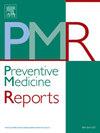Exploring longitudinal associations between social determinants of health during adolescence and self-reported contraceptive use in young adulthood in the United States
IF 2.4
3区 医学
Q2 PUBLIC, ENVIRONMENTAL & OCCUPATIONAL HEALTH
引用次数: 0
Abstract
Objective
Childhood environment and socioeconomic status influence adult health. Past research links early social and economic disadvantages to later-life diseases and substance abuse, but their effects on contraceptive use remain unexplored. This longitudinal study utilizes the Social Determinants of Health (SDH) framework to explore the associations between social domains in adolescence and contraceptive use in young adulthood.
Study design
Fourteen measures of the SDH domains were extracted from the National Longitudinal Study of Adolescent and Adult Health Wave I data (1994–95) to explore associations with reported ever-use and consistent use of contraception among young adults in the U.S (18–26 years) at Wave III (2001) using multilevel logistic regression.
Results
Among 11,172 participants, 87.60 % reported past-year ever-use of contraception, while 47.30 % were consistent contraceptive users. Measures significantly associated with the past year's ever-use of contraceptives in young adulthood included parents' high school graduation status (positive/+), volunteering experience (+), history of foster care (negative/−), and parental reporting a trash problem in the neighborhood (−) during adolescence. For consistent use of contraception in young adulthood, parent high school education (+), volunteering experience (+), higher social cohesion scores (+), access to health care (+), receiving family planning counseling (−), parental receipt of public assistance (−), non-English language spoken at home (−) and the number of neighborhood crimes (−) during adolescence were found to be significant.
Conclusions
A favorable environment during adolescence provides a foundation for positive health behaviors. Interventions aimed at improving contraceptive use in young adulthood should consider creating supportive environments for adolescents.
探索青春期健康的社会决定因素与美国青年自我报告的避孕使用之间的纵向联系
目标 儿童时期的环境和社会经济地位会影响成年后的健康。过去的研究将早期的社会和经济劣势与日后的疾病和药物滥用联系起来,但它们对避孕药具使用的影响仍未得到探讨。这项纵向研究采用了健康的社会决定因素(Social Determinants of Health,SDH)框架来探讨青少年时期的社会领域与成年后避孕药具使用之间的关系。研究设计从美国青少年和成人健康国家纵向研究第一波数据(1994-95 年)中提取了 14 个 SDH 领域的测量指标,以探讨美国青少年(18-26 岁)在第一波数据中报告的曾经使用和持续使用避孕药具的情况。结果在 11,172 名参与者中,87.60% 的人报告在过去一年中曾经使用过避孕药具,而 47.30% 的人是持续避孕药具使用者。与过去一年曾在青年期使用避孕药具有明显相关的指标包括:父母的高中毕业情况(正/+)、志愿服务经历(+)、寄养史(负/-)以及父母在青少年时期曾报告附近有垃圾问题(-)。结论 青少年时期的良好环境为积极的健康行为奠定了基础。旨在提高成年后避孕药具使用率的干预措施应考虑为青少年创造有利的环境。
本文章由计算机程序翻译,如有差异,请以英文原文为准。
求助全文
约1分钟内获得全文
求助全文
来源期刊

Preventive Medicine Reports
Medicine-Public Health, Environmental and Occupational Health
CiteScore
3.90
自引率
0.00%
发文量
353
 求助内容:
求助内容: 应助结果提醒方式:
应助结果提醒方式:


